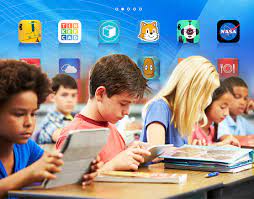If your child is having difficulty in class due to the use of learning apps, you can ask your child to opt out of using the particular ones. However, this might result in your child being socially isolated, or may lead to your child being left out of specific classwork. If this is a serious problem, you should write to the school or district and inform them of your child’s concerns. It is also a good idea to contact other parents so you can share your concerns with them.
ShowMe
The ShowMe learning app for school students lets students create their own video lessons, and watch others’ lessons. It fosters personalized learning by organizing information, and empowers students’ thinking. The app is free for all ages, and it can be used in either synchronous or asynchronous settings.
Whether your student is in a one-on-one learning environment or a group of students, ShowMe allows them to upload and share documents, images, and videos to show the teacher. They can also use the app to make voiceovers. Students can also record their own voice to tell their stories.
My Molecularium
The My Molecularium learning app for school students is designed to help kids build molecules and learn about chemistry. The game is highly engaging, and the molecular models are highly interactive. It also helps students make connections between chemical formulas and the structure of different molecules. Its fun interface may leave some students frustrated, but the game offers a fun way to learn about different kinds of molecules.
The game is free and available on the Apple App Store and Google Play. It’s part of the Molecularium Project, an outreach initiative from the Rensselaer Polytechnic Institute Nanotechnology Center. It teaches students about the structure of different molecules and atoms. The games are fun and engaging and help motivate students to study and learn.
Duolingo
The Duolingo app is a popular learning tool for school students, focusing on cartoon characters and animations to help students learn a new language. The app has gained popularity in recent years and has increased its user base to over 500 million people. Its growth is attributed largely to the fact that most school-aged children have access to laptops and smartphones. Parents don’t mind their kids spending time on their devices for study purposes as long as they are doing so in the classroom. However, the app’s “health” component penalizes users for incorrect answers, which discourages students from continuing. The good news is that these penalties can be repaid through more practice sessions.
While the app is free for students, it’s also useful for teachers. The teacher’s guide has helpful tips for using the app in the classroom. The app offers many useful tools to track student progress, including student profiles and progress reports. It also allows teachers to set goals for specific skills, like vocabulary and grammar. Teachers can also assign homework and encourage students to compare their scores to others’.
Funbrain Jr
The Funbrain learning app consists of various games and activities for kids, each focusing on developing math and reading skills. Users can choose which level they are working on and then load a game that meets their needs. The games are available in several categories and each game will show the user the level of difficulty, so they can choose the right level of challenge. Each game also includes instructional text to help the student with the game play.
Funbrain Jr is designed to help young students develop a love of learning. The games help students develop skills in math, reading, geography, and problem-solving. The learning app is free to download and comes with optional in-app purchases.
New American History
The new American History learning apps for school students are designed to help students engage with historical content. Each app contains a variety of interactive games that connect to the content of the lessons. Several games require students to answer essential questions, while others require students to analyze and interpret images or text. In addition, some of the apps offer teachers resources, including lesson plans and additional content.
Think Fast! About the Past is one such app. This app has hundreds of fascinating facts about different eras in US history. It includes 365 images and documents from the US National Archives. It also includes a search engine so users can explore at their leisure.
Edmodo
Students who are in school can use Edmodo to share ideas and collaborate with their peers. The app is very user-friendly and has a step-by-step guide for end-users. It is available for students, educators and parents to use free of cost and does not contain ads.
The app features a message center where students can send each other individual or group messages. The app also works with Google Classroom. Unlike other social networking sites, students do not have to share their personal information in Edmodo.
Khan Academy
Khan Academy is a nonprofit educational organization that produces short video lessons that teach students different topics. The videos are downloadable or streamed directly from the website, and students can also access supplementary practice exercises. More than 8,000 videos have been created so far, and all of them are free.
Students can take their learning apps to school and use them to review material or learn something new. There are also classes available by grade, and they range from early math to high school geometry and calculus. The apps also offer games, cartoons, and other learning materials.


Everything About A Construction Lawyer
If you are in the construction business, you will want to hire an experienced lawyer to help you with your legal matters. There are many aspects of this trade that a lawyer is trained to handle. These include Dispute resolution, Contract drafting, and Labor and Property law. These professionals will make sure that you have […]